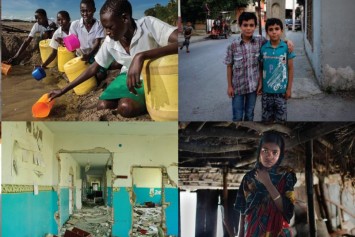Global leaders try to halt the ‘education deficit’
Governments’ responsibility to ensure quality education for all will be put on the table as policymakers and funding agencies meet in Norway to adopt measures to improve access to quality education globally.

Cover of the report Education Deficit/ HRW
Key governments are gathering in Oslo for a three-day meeting which will look at ways to allocate much-needed resources and adopt strategies to meet the international community’s goal to reach free, equitable, and quality primary and secondary education by 2030. The event was preceded last week by the timely release of a new report by Human Rights Watch (HRW) which highlights the urgency to reaffirm governments’ responsibilities and establish clear accountability for human rights and education obligations.
GPE demands governments’ commitment
The board of directors of the Global Partnership for Education (GPE), which is holding its biannual meeting parallel to the Oslo meetings, has convened a panel of global experts and education leaders that will discuss how to ensure the right to education is fulfilled through governments’ development agendas. The new HRW report will be at the core of the discussions. Participants include Alice Albright (Chief Executive Officer, GPE), Elin Martínez (children’s rights researcher), and Jordan Naidoo (Director, Education 2030, UNESCO), and David Edwards (Education International Deputy General Secretary) as the chair of the panel.
“The Education Deficit: Failures to Protect and Fulfil the Right to Education in Global Development Agendas”,the HRW report published last week, clearly shows that many governments who have signed on to development agendas and form part of global partnerships are also failing many of their school-aged children. Based on research in more than 40 countries, covering nearly two decades, it highlights how discriminatory laws and policies and a lack of political will to carry out basic human rights obligations by countries around the globe are keeping millions of children and adolescents out of school.
Stakeholders’ accountability
According to HRW, it is mainly inaction by governments which leads to the paradox of the “education deficit”: a shortfall between the educational reality that children experience around the world and what governments have promised and committed to through human rights treaties. The reports’ authors also highlight that the education deficit not only undermines the fundamental human right to education, but has real and dire consequences for global development and entire generations of children.
The recommendations included in the report are aimed at governments and donors alike. The former should ensure that primary education is truly free and compulsory and that secondary education is free. They should eliminate discriminatory policies or regulations that allow schools to exclude children and adolescents.
The report calls on donors (including multilateral financial institutions such as the World Bank and international agencies that help governments carry out their education plans) to uphold human rights standards and “not compromise on abuses that leave children and adolescents out of school”.
Source: Education International
- 281 reads
Human Rights
Ringing FOWPAL’s Peace Bell for the World:Nobel Peace Prize Laureates’ Visions and Actions

Protecting the World’s Cultural Diversity for a Sustainable Future

The Peace Bell Resonates at the 27th Eurasian Economic Summit

Declaration of World Day of the Power of Hope Endorsed by People in 158 Nations

Puppet Show I International Friendship Day 2020

